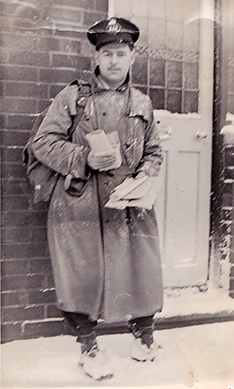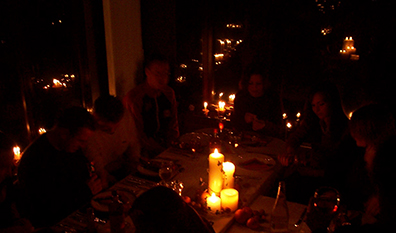Anticipation is a huge part of Christmas, and memories add to it.
I remember carol singing at Christmas. Groups of the braver kids would go round the estate, singing “Hark the Herald” or “While Shepherds Watched” at likely doors, hoping for chocolate or a sixpence—but lucky if they got a penny to share. Teenagers and young adults would visit the homes of our Church congregation and serenade them. Exciting, exhilarating, often cold. Some crushed into cars, some walked, I rode my bike. Homes had different traditions for the carollers: at my mother’s it was always ginger wine (home made, non-alcoholic) and shortcake. Jean Sparkes (née Griffiths) offered raisin wine. We always ended up at Eva Cupryna’s, who gave us Sloppy Joes (Big Mac eat your heart out)—scrummy for frost encrusted singers! But carolling has waned. We haven’t had any carol singers at our door for years. Many children are growing up not knowing traditional Christmas carols. They don’t sing them in school assemblies or nativities (might offend non-Christians you know), they don’t attend church, their parents don’t sing them at home . . . how profoundly sad. As a child, my Christmas world was filled with “Away in a Manger”, “Silent Night”, “Oh Little Town of Bethlehem” and all the rest: sung by my mother doing housework, sung at church on Sundays, broadcast on the wireless, played in shops, and most memorably sung in assemblies each morning, at primary and secondary schools.
I remember the sound of the Sally Army brass band, downtown on Linthorpe Road, playing carols and collecting. That sound is one of the most nostalgic memories of all. Close behind it is the smell of roasting chestnuts from street corner vendors with cherry-red braziers, then burned fingers as we tried to shell them too soon. That reminds me of the torment of Christmas shopping as a young teenager with little money. Finding appropriate and affordable gifts was agonising. I only had a few to buy, but oh, the frustration trudging from shop window to shop window in Middlesbrough town centre, clutching a few shillings in my pocket, trying to find something suitable for mum or dad. Nose and fingers pressed up to the glass, too shy and nervous to look around inside, misting the cold glass with my breath and wandering from one shop to another. Now, was that penknife or necklace back there really too expensive . . . scurry back three shops . . . yep, price hasn’t changed in the last ten minutes, still can’t afford it. No online shopping in those days of course: it was high street shops or make-it-yourself (which I did occasionally). Woolworths often rescued me in the end with its cheap range of quirky odds and ends. I remember one year buying my mother a wooden cheeseboard with an inlaid ceramic design. I was exasperated when it was never used as a cheeseboard: she hung it on the wall as a decoration.

I remember that mail was delivered on Christmas day (ending in 1960), especially since my dad was a postman. The excitement of cards and gifts arriving that day was part of the celebration. Postmen often became a family friend in those days, stopping for a chat and to pass on gossip. He was an essential part of the community, especially in rural areas. At Christmas there was always something for the postman’s “Christmas box” and dad might come home in the evening with a satisfying haul of money and gifts. I think, though, working on Christmas day was one reason why dad’s Royal Mail career lasted only a few years.
I remember the excitement of my Christmas stocking, empty and limp at bedtime on Christmas Eve, but heavy and lumpy on Christmas morning. Always, at the end of the toe, there was an apple and an orange. Just ordinary fruit, made special by the occasion. I suppose that the tradition was from a time when oranges and even apples were hard to come by, a special treat for children and perhaps all their parents could give. My memories are more fortunate than that; although my parents weren’t rich, we weren’t destitute either. But a careful reading of Matthew and Luke reveals that the original Christmas story is one of poverty. The newlyweds didn’t possess much. They would be amazed at what even poor families enjoy for Christmas today.
The commercial side of Christmas has long overshadowed the Bethlehem stable. I remember when churches were full on Christmas Eve for a carol service, but now I suppose for a majority, presents and parties comprise the entire celebration and only a few honour the birth of Jesus Christ. Less than half our Christmas cards are religious; the rest are lovely of course, bringing greetings from family and friends—but have little to do with the Christmas story. Joseph, Mary and baby Jesus have been supplanted by Santa and snowy scenes. Even so, let’s remember that the true Christmas story is all about gifts: gifts from the Wise Men of course but above all the gift of the Son of God. The helpless babe wrapped in swaddling clothes held close by Mary, was the great Jehovah, creator of this earth and the entire universe. I’m unable to get my mind around that, but I know it to be true. As the carol says, in Bethlehem “the hopes and fears of all the years are met in thee tonight”. Yet Joseph was too poor to offer the expected lamb for a temple sacrifice, and had to offer two young pigeons instead—a substitution allowed in Jewish law only for the truly impoverished. Imagine it: the mighty Creator of worlds without number, born to a couple who could only scrape together a bare minimum to fulfil the requirements of the law for a firstborn son—a law that Jesus himself had given to the Jews. Christmas, the story of the stable is wider, deeper and greater than we realise. Our happiest memories and expectations lead us towards it but only faith takes us on the full journey.




Nice post. I learn something totally new and challenging on blogs I stumbleupon every day. It will always be exciting to read through content from other writers and use something from other web sites.